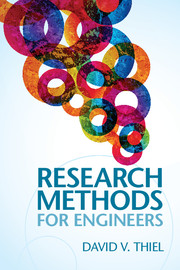Book contents
- Frontmatter
- Contents
- Preface
- An introductory note for instructors
- 1 Introduction to engineering research
- 2 Literature search and review
- 3 Developing a research plan
- 4 Statistical analysis
- 5 Optimization techniques
- 6 Survey research methods
- 7 Research presentation
- 8 The path forward
- Appendix A: Matlab plot functions
- Appendix B: Excel plot functions
- Index
- References
3 - Developing a research plan
Published online by Cambridge University Press: 05 September 2014
- Frontmatter
- Contents
- Preface
- An introductory note for instructors
- 1 Introduction to engineering research
- 2 Literature search and review
- 3 Developing a research plan
- 4 Statistical analysis
- 5 Optimization techniques
- 6 Survey research methods
- 7 Research presentation
- 8 The path forward
- Appendix A: Matlab plot functions
- Appendix B: Excel plot functions
- Index
- References
Summary
Research proposals
Like most engineering work, a research project should be structured and costed before it is commenced. This should ensure that the project plan is coherent and viable and acceptable to the project team and that all resources are available. In the tertiary setting, most universities require that students applying to undertake an internship, Master's degree or PhD degree must provide a one page outline of the topic as part of their application for admission. The project description is usually planned with one or more prospective supervisors, includes the background to the research, the contribution it will make, the resources required, the tools to be used and the likely outcomes.
For many researchers, a primary requirement might be to write research funding proposals. In this case the funding organization will require answers to specific questions. This process is very similar to a quotation (financial estimate) to undertake engineering work. As with engineering projects, the funding organization needs to be reassured that the research team has the necessary skills, a good track record, and that the results will be delivered ‘on time and on budget’. Incomplete or inadequate research planning can lead to a failure to achieve the required outcomes, and the funding organization is unlikely to trust the researchers again. This chapter is aimed at providing guidance to the novice researcher so that the research plan is clear and comprehensive and the research team is presented in the best possible light, demonstrating the expertise necessary to achieve the planned outcomes.
- Type
- Chapter
- Information
- Research Methods for Engineers , pp. 73 - 113Publisher: Cambridge University PressPrint publication year: 2014



